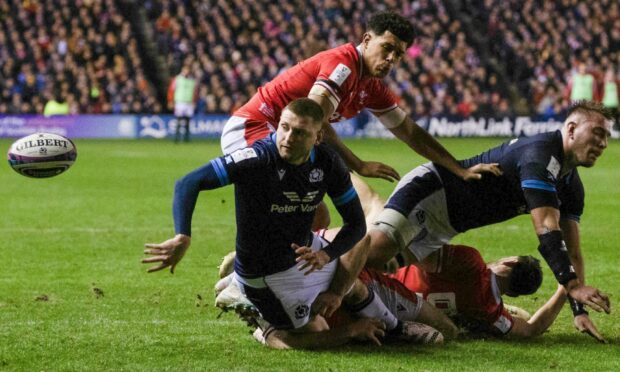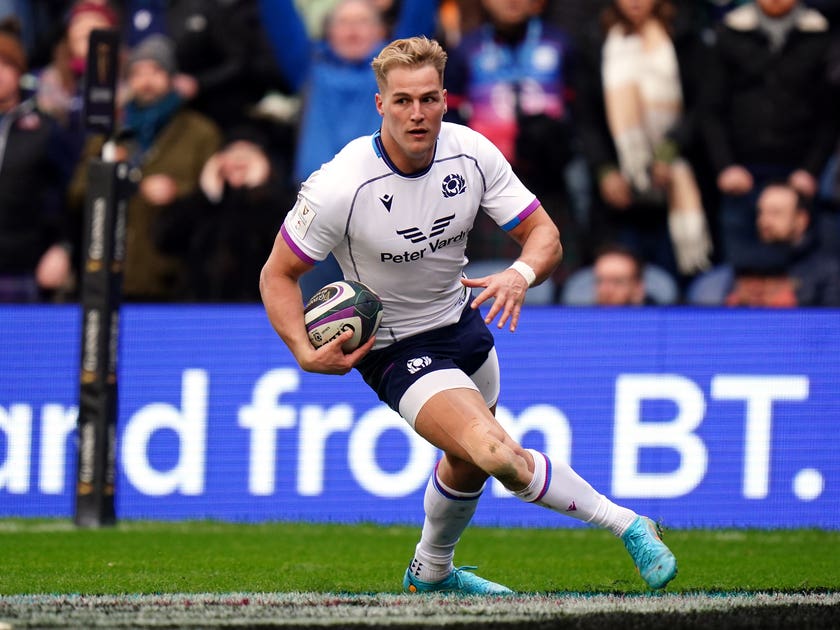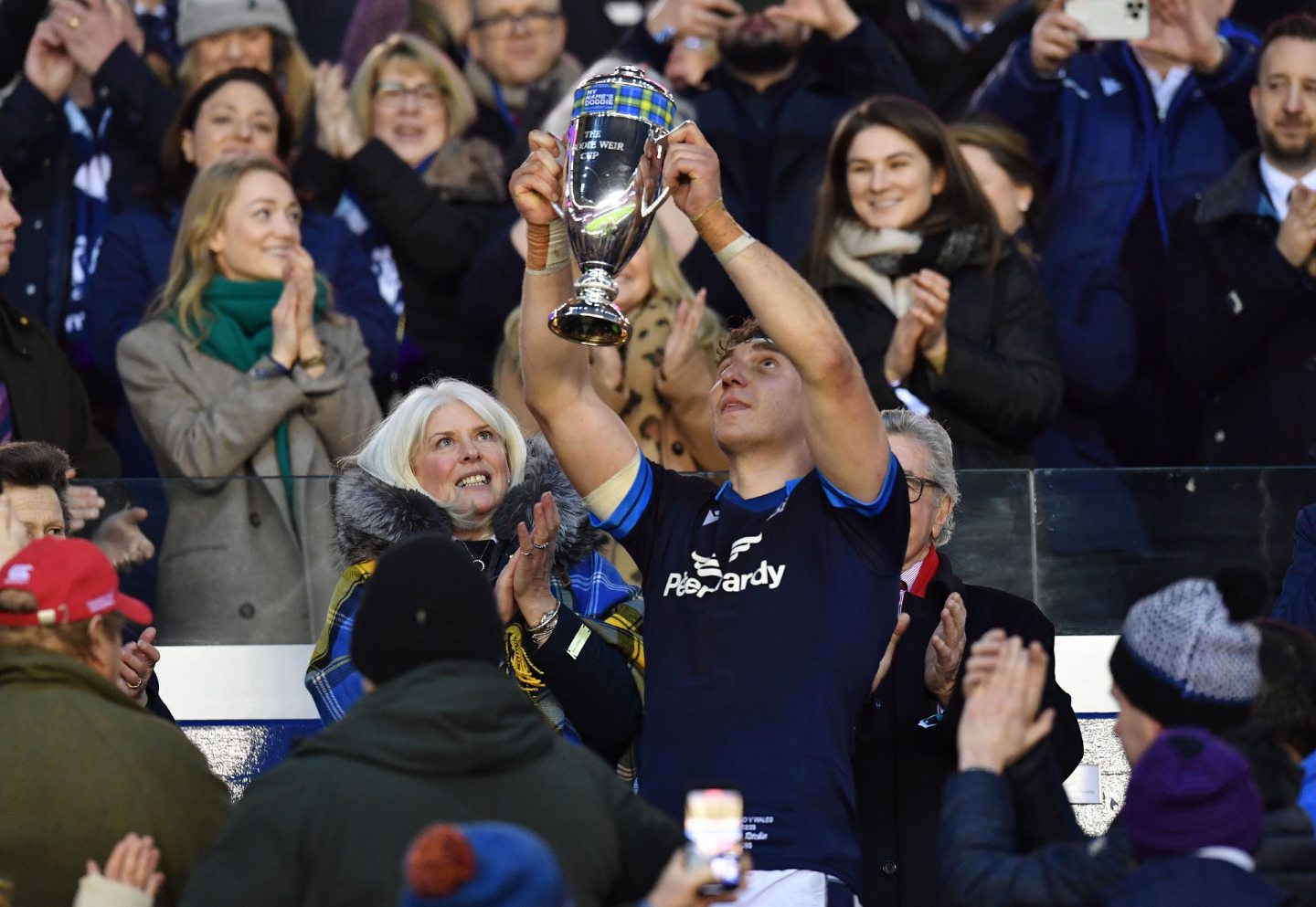I loved the glint in Finn Russell’s eyes as he joked on Saturday night: “I was just doing my job out there, making the other boys look good”.
Arrogance? Nope.
Confidence?
Well, why not after you have just served up a mesmerising masterclass of skills to leave hapless Wales clutching at shadows as the orchestrator of Scotland’s record-breaking 35-7 victory. In a Six Nations Championship which is reminding us of how this sport can be a beautiful behemoth of champagne rugby and full-blooded aggression when it hits the heights.
Prior to the tournament, I was pilloried in some quarters for suggesting Gregor Townsend’s squad could challenge for the title, yet they have demonstrated enough qualities in their brace of wins to suggest these players believe they can beat anybody in the world.
Russell has been the catalyst for many of the magic moments, but his fellow backs, including Duhan van der Merwe, Huw Jones, Sione Tuipulotu, Kyle Steyn and Blair Kinghorn, have posed a constant threat and pounced on any openings.
After securing the Calcutta Cup, their captain Jamie Ritchie spoke of how that triumph would mean nothing if his personnel didn’t follow it up and exorcise their Gatland hoodoo, and his redoubtable leadership ensured there was never any prospect of the team going into reverse gear.
They lost Stuart Hogg to a head knock and it didn’t matter. They were missing several high-profile players, including Rory Darge and Hamish Watson, yet there’s an unprecedented strength in depth at their disposal.
And, even in the afterglow of the Wales success, with Ritchie paying a warm tribute to the late lamented Doddie Weir, he was at pains to accentuate how the Scots were nowhere near achieving an 80-minute performance for the ages.
The first half was closer to arm-wrestling than rugby for long stages. Russell’s kicking wasn’t perfect. There were a few soft penalties conceded, and George Turner’s yellow card allowed the visitors a brief toe-hold into the contest. Yet they still pulverised the men in red.
The question now, of course, is whether they they can continue to impress in their next brace of fixtures, away to France on February 26 and against Ireland at Murrayfield on March 12.
Anybody who watched the coruscating clash between these sides in Dublin on Saturday – when the hosts eventually surged to a 32-19 win – will appreciate they both pose significantly sterner examinations than Scotland have so far faced and, to be honest, these are the equivalent of two World Cup finals in the space of a fortnight.
However, while Les Bleus are a formidable proposition and will be determined to regain momentum after their first loss in 15 matches, the pressure will all be on them and the focus on the likes of Antoine Dupont and head coach Fabien Galthie, rather than their opponents.
The latter spoke philosophically about the weekend’s setback, uttering the rather Cantona-esque words: “Defeat is not really a friend, but we will have to spend the day with her.” But he and his colleagues know all about Russell’s wow factor and how he can create opportunities with an instinctive vision which is rare in the modern game.
France, in contrast, were lacking va va voom, in terms of their collective attacking menace, for much of the proceedings in Dublin. In the second half, they battered and bulldozed away relentlessly as they strove to pierce Ireland’s impressive defence, but, too often, depended on the blunderbuss approach when a piece of imagination or off-the-cuff spontaneity might have yielded a richer reward.
Here’s one example. With the French trailing 25-16 on the hour mark, there was plenty of perspiration from their forwards, but despite 12, 13, 14 phases, it was a plodding, pedestrian passage. Eventually, in what amounted to damage limitation considering how much possession they had enjoyed, Thomas Ramos chose to kick a drop goal.
Scotland are bolder than the French
Granted, it meant that his confreres moved to within one score of the Irish, but I don’t think Scotland would have taken that option, not with the abundance of talent they have out wide, allied to Russell’s ability to alter the angle of attack, either with his hands or feet.
They would have gone for something bolder, which might have brought a greater reward than three points.
Apart from anything else, the hosts looked content with Ramos’ decision-making and soon pulled out of sight with a more direct approach.
Let’s not be over-optimistic about the trip to the Stade de France. It will be an almighty test of Scotland’s credentials, a ladder’s worth of rungs above anything offered by feckless, fragile Wales.
But equally, let’s not minimise the transformation in the team’s fortunes, nor their new-found freedom of expression.
Perhaps it has something to do with the fact this will be Townsend’s last Six Nations in the role? He knows the end is nigh and so does Russell. The old feuds and negative headlines are last year’s chip wrapping.
We can dare to dream of glory
I was in Paris in 1995 when Townsend released Gavin Hastings for the last-gasp coup de grace at the Parc des Prince.
I was there in 1999 when the Scots ran riot with five tries in the first 40 minutes of an extraordinary encounter.
They ended up lifting the championship that year. And who’s to say that history won’t repeat itself when the Class of 2023 pursue a third consecutive win later this month?





Conversation